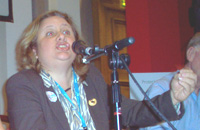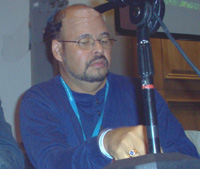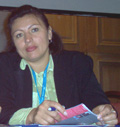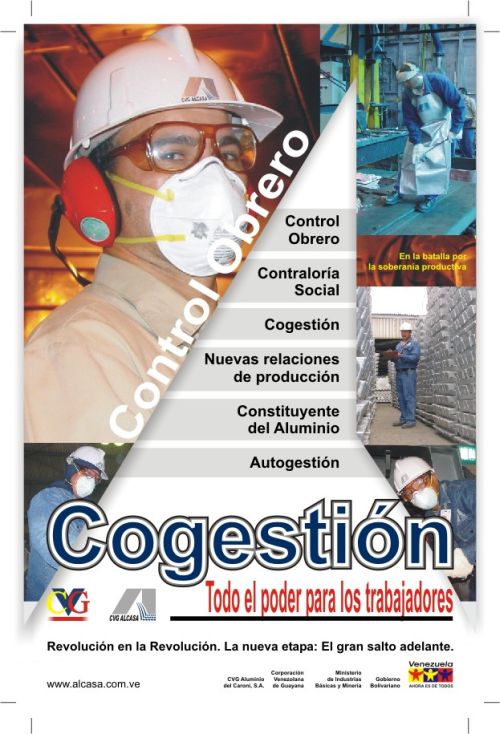British TUC shows solidarity with Latin America
- 12 September 2006
More than 120 people packed the Latin America fringe meeting at the TUC on Monday, September 11. The meeting had been organised by the TUC General Council, together with a number of solidarity campaigns (Cuba Solidarity Campaign, Justice for Colombia, Hands Off Venezuela and VICUK), and sponsored by Thompson's solicitors.
As we were going into the meeting there was a lively picket outside the Grand Hotel in Brighton, with trade union activists shouting "Hands Off! Hands Off!" When we asked what they were protesting about we found out they were RMT activists, including general secretary Bob Crow, fighting against the privatisation of the East London Line which has been proposed by Transport for London and London Mayor Ken Livingstone.
The Latin America meeting was chaired by a Sally Hunt, a representative of the TUC General Council, which shows the importance that was given to this meeting. She expressed the will of the TUC to build "lasting relations with our trade union comrades in Venezuela".
 After a short introduction, we were shown a video of the Trade Unions with Cuba Conference which had taken place in London earlier in the year. This was followed by a speech by Zelmys Rodriguez, the First Secretary of the Cuban embassy in Britain. She explained that Cuba was so dangerous "because of the example it provides of a new society ... because we export our doctors and teachers around the world" and referring to Mission Milagro she added: "we are dangerous because we give light to the blind people."
After a short introduction, we were shown a video of the Trade Unions with Cuba Conference which had taken place in London earlier in the year. This was followed by a speech by Zelmys Rodriguez, the First Secretary of the Cuban embassy in Britain. She explained that Cuba was so dangerous "because of the example it provides of a new society ... because we export our doctors and teachers around the world" and referring to Mission Milagro she added: "we are dangerous because we give light to the blind people."
She then denounced the double standards of the US administration regarding the struggle against terrorism, explaining how Washington harbours and protects self-confessed terrorists like Posada Carrilles and Orland Bosch, while it jails the Cuban Miami Five for the crime of having exposed the terrorist activities of the Cuban mafia in Miami.
 Next to speak was Rafael Chachón from Venezuela, who is a leading member of the Bolivarian Workers' Front tendency of the UNT, and currently has a position in the Ministry of Education. First of all, he detailed the achievements of the Bolivarian Revolution in the fields of education and healthcare. He then explained the origins of the UNT which was born out of the struggle against the bosses' lock-out in December 2002 (supported by the old CTV bureaucracy). He said that "elements of the capitalist state still remain" and that the "UNT must become a revolutionary trade union".
Next to speak was Rafael Chachón from Venezuela, who is a leading member of the Bolivarian Workers' Front tendency of the UNT, and currently has a position in the Ministry of Education. First of all, he detailed the achievements of the Bolivarian Revolution in the fields of education and healthcare. He then explained the origins of the UNT which was born out of the struggle against the bosses' lock-out in December 2002 (supported by the old CTV bureaucracy). He said that "elements of the capitalist state still remain" and that the "UNT must become a revolutionary trade union".
Chacón insisted that the December 3rd presidential elections were in fact "not a struggle against internal opposition but a struggle against Bush". He also explained the seven strategic lines defended by President Chavez for his next term of office, including the building of "socialist morals in the struggle against bureaucracy and corruption" and the building of "a socialist economy". He ended his speech by joking that in his next visit to Britain he would be coming from a "socialist Venezuela" which was received by applause from the audience.
Repression in Colombia
 Next to speak was Aidee Moreno, from the Human Rights Department of Colombia´s agricultural workers' union FENSUAGRO. In a moving speech she explained how trade unionists in Colombia are "a target for the military and are subject to repression by the government and the armed forces". Since president Uribe came to power "more than 500 trade union activists have been killed" she explained. Impunity is one of the main problems and this was being made worse by a new law introduced by Uribe. She insisted that British trade unionists must fight to put an end to the military aid that the British government gives to Colombia. Aidee finished her intervention by making an appeal to British trade union activists "to remain vigilant to defend Colombian trade union activists".
Next to speak was Aidee Moreno, from the Human Rights Department of Colombia´s agricultural workers' union FENSUAGRO. In a moving speech she explained how trade unionists in Colombia are "a target for the military and are subject to repression by the government and the armed forces". Since president Uribe came to power "more than 500 trade union activists have been killed" she explained. Impunity is one of the main problems and this was being made worse by a new law introduced by Uribe. She insisted that British trade unionists must fight to put an end to the military aid that the British government gives to Colombia. Aidee finished her intervention by making an appeal to British trade union activists "to remain vigilant to defend Colombian trade union activists".
Aidee was followed by a brief speech by Colin Burgon MP, who has always been active in Parliament on the issue of Cuba and more recently also on Venezuela.
Debate on workers' control
During the questions session, Jorge Martin, from the Hands Off Venezuela campaign, spoke briefly. He asked Chacón about the experiences of workers' control and participation which are taking place in Venezuela and specifically mentioned Alcasa and the occupied factories which were then expropriated and put under one form or another of workers' participation. Jorge also said that Chavez had opened the debate about socialism, "after many years of demonisation after the fall of the Berlin Wall", and how Chavez had stated clearly that "Capitalism is not the answer, and that the way forward is socialism". He added that "we have a lot to learn in this respect" and paraphrasing NATFHE´s John Wilkin speaking at the TUC the previous year, Jorge said "we need a bit of that Bolivarianism in the British trade union movement".
 This prompted a response by Jacobo Torres, also a leading member of the Venezuelan FBT who is now working in the Foreign Affairs Ministry. He stressed that we should not fall into the "dangerous temptation to label our process or to apply recipes to it". He added that, "we cannot repeat the serious error of revolutionaries in other countries of mixing up our desires with the rhythm of the revolution". He stressed that the question of socialism is not posed immediately in Venezuela, as we are still "in a transitional phase".
This prompted a response by Jacobo Torres, also a leading member of the Venezuelan FBT who is now working in the Foreign Affairs Ministry. He stressed that we should not fall into the "dangerous temptation to label our process or to apply recipes to it". He added that, "we cannot repeat the serious error of revolutionaries in other countries of mixing up our desires with the rhythm of the revolution". He stressed that the question of socialism is not posed immediately in Venezuela, as we are still "in a transitional phase".
Regarding workers' control he made it very clear that "we cannot talk about workers' control in Venezuela, regardless of what some have been saying" (in a clear reference to Jorge Martin's question). This issue, he said, is still the subject of a long debate amongst Venezuelan workers who have "neither the culture nor the level of consciousness needed to implement workers' control". What there is in Venezuela is a number of factories which were bankrupt and had been "recovered by the state, following the rules in the constitution", therefore there could be "no talk of workers' control", and above all there is "no workers' control in any of the basic industries in Guayana, including Alcasa".
This was quite surprising, since in fact a form of workers' control does exist in factories like Inveval, Invepal and others. It might be called "cogestión" (co-management), but what happens there is that the workers, through the workers', assembly have a decisive say in the running of the factory. In Alcasa, in fact, the workers do elect all managerial levels of the company (with the exception of the chairman), and these are subject to the right of recall (see for instance a BBC report on this: http://news.bbc.co.uk/1/hi/business/4155936.stm). What the intervention of Jacobo Torres clearly showed, however, was the existence of serious differences within the Bolivarian movement and within the trade union movement about the struggle for socialism and about the role of workers in it.
There are those, in the reformist wing of the movement, that insist on the fact that private property must be respected, that the struggle is only against imperialism (at this stage), not against the local capitalists, and above all, that the workers do not have the necessary consciousness to exercise power directly (not even at factory level through workers' control). Because they do not like what is happening, they try to deny it is actually taking place, or in the case of the electricity company CADAFE, they block any attempts of the workers to exercise workers' control. This is quite dangerous because it can lead to demoralisation and apathy, something which would undermine the basis of support for the revolution.
There are those, on the left, revolutionary wing of the movement who argue that only by decisively taking measures to complete the revolution, can this be defended in an effective way. The argument that the workers have no consciousness is so preposterous that it would not even merit an answer. It was the ordinary workers of the oil company PDVSA who took it over, saved it from the lock-out and sabotage of the counter-revolution, and ran it under workers' control for a few weeks, in December 2002. It was ordinary workingmen and women who came out en masse in April 2002 to defeat the coup against Chavez. If they can do that, surely they can run industry and society as a whole.
As Colin Burgon said, there are many things British workers can learn from their Venezuelan brothers and sisters. The debates that are taking place within the Bolivarian revolution should also be brought here, because they affect the future of the revolution, in Venezuela and in Britain as well.
At the end of the meeting there was a lot of interest in Hands Off Venezuela with many trade union activists leaving their contact details.